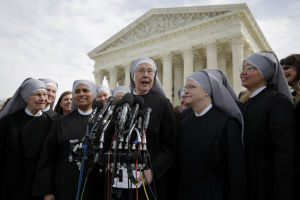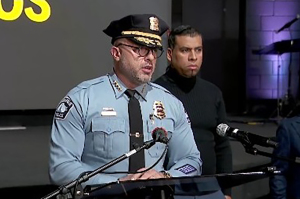We Need More 'Extremists' Like Chris Kyle
Chris Kyle, arguably the greatest sniper in American history, was my son's first real hero. He devoured Kyle's book the instant it came out, and he immediately vowed to join the military and become a sniper himself. As soon as he started sixth grade, he joined our school's trap and skeet team, he bought books about firearms, and started reading everything he could about the SEALs. He was already interested in the military because of my service and deployment, but Chris Kyle captured his imagination (SEALs are bit more hard core than JAGs, sorry to say). As a dad, I could think of few better role models for a young boy - a warrior who never left a man behind, either downrange or at home, where he made it a priority to care for vets who struggled with PTSD.
When Kyle died, shot by one of the vets he reached out to help, our son was crushed. We were all crushed. America lost one of its finest.
I was reminded of the heroic life and tragic death of Chris Kyle by this profile in The New Yorker. As one might imagine (considering the source), it's hardly hagiographic, but the portrait it paints - of a hard-living, courageous, warrior who told some tall tales, suffered through his own post-war struggles, and vowed to help those who suffered like him - is consistent not only with Kyle's book, but also with the portrait of many of our vets, including many of the men with whom I served. By the end of the piece, I found myself admiring Kyle even more. A true hero isn't a man who glides through life, shrugging off the burdens that would crush others. A true hero fights through - just as Kyle fought to save his brothers-in-arms, fought to save his marriage, fought through his own demons, and fought the most vile evil of modern times, jihadist Islam.
And there's the catch.
The New Republic's Isaac Chotiner read the same New Yorker piece and came to a different conclusion. In a piece called, "If Chris Kyle Had Been a Muslim, We'd Call Him an Extremist," Chotiner yanks elements of Kyle's life out of context and paints an astoundingly distorted picture:
Imagine the following scenario: a young Muslim from the Islamic world joins his country's armed forces to fight an aggressive war against an overwhelmingly Christian nation. He gains accolades for his work as a sniper, executing his job with ruthless efficiency and little remorse. He admits to viewing the war he is fighting through the prism of religion. He gets a tattoo on his arm declaring that he embraces the concept of holy war [Chotiner is referring to a cross]. When parliamentarians in his own country question the conduct or course of the war, he states, "How would they know? They've never even been in a combat situation." After shooting someone whose widow claims he was holding a Bible rather than a gun, he answers, "I don't shoot people with Bibles. I'd like to, but I don't."
How would this person be described when his story was recounted in the western press? That's easy: He'd be described as an Islamic fundamentalist-aggressive, dangerous, and intent on evil.
To be fair, Chotiner isn't actually saying that Kyle is morally equivalent to the Taliban. In fact, his true target isn't Kyle, but the society that produced him. Here's Chotiner again:
I mention all this not to draw moral equivalence between Chris Kyle and someone from, say, the Taliban, because I don't think they are morally identical, or even roughly equivalent. But the narrative Schmidle lays out goes too easy on the society in which Kyle was formed.
He continues:
Again, the point is not about moral equivalence between Kyle and a Talib or between America in 2013 and Afghanistan under the Taliban. (For starters, Kyle was a staunch Republican whose very participation in our political system demonstrates a belief in representative government.) Instead, it is that Kyle comes from an American subculture where his views-the ones on how to treat members of other religions, not just how to treat troubled veterans-are permissible.
In other words, the problem isn't Kyle, it's the society that produces someone as problematic as Kyle.
There's much to say about this, but let me begin by saying it's simply fundamentally inaccurate to call or compare Kyle to a religious extremist. Regarding his treatment of "members of other religions," let's be clear that he risked his life to save Muslims and rescue them from the dark tyranny of true extremism. The fact that he emerged from that experience with no love for Islam itself is hardly surprising. Those of us who lived and fought - and saw friends die - at the sharp edge of jihad again and again experienced the same phenomenon: In that environment the more overtly religious the Muslim we encountered, the more likely he was to not only want to kill Americans (the "occupiers") but to also kill innocent men, women, and children.
I've recounted the atrocities in my unit's Area of Operations before – raping women to shame them into suicide bombing, blowing up restaurants then blowing up first responders, hiding bombs in the backpacks of unsuspecting children, shooting infants then shooting the mothers as they cradled the remains of their dead child, shrieking "Allahu Akhbar" as they saw the heads off old women (while filming the deed and spreading the DVDs around town) - and such atrocities cause right-thinking, rational, compassionate human beings to feel, well, rage. Since he was "outside the wire" vastly more than I ever was (I could not even begin to compare my meager efforts to Kyle's), I'm sure that he saw much worse, and saw it up close. These atrocities cause those of us in uniform who believe in God and follow Christ to understand that part of our calling on this Earth is to oppose that vile and vicious evil. If that morally responsible response makes us "extremists," then I wear that badge with great pride. Heck, if I could pull it off (sadly, I don't have the forearms for a good tattoo), I'd put a cross on my arm as well.
I've also shared Kyle's contempt for the critiques of those members of Congress (and others) who attempt to explain away the threats we've seen with our own eyes and criticize combat operations they can't possibly comprehend (nor even try to comprehend). Willful ignorance is not worthy of respect.
Let's be very clear, it is a great tragedy of American life that communities such as the one that produced Chris Kyle can now be deemed a "subculture" by Chotiner. It is not an insult to say that the Chris Kyles of our history have made it possible for the Isaac Chotiners (and the David Frenches) to live the lives we lead. What would our nation be like but for the warriors who had the courage and convictions (yes, often religiously-motivated) to storm British strongpoints at Yorktown, repel Pickett's Charge, and hold Bastogne against elements of seven German divisions? Such warriors are not teddy bears, soft and cuddly except when they (regretfully) fight. They are hard men. They often live hard and fast, fight with contained and disciplined fury, and follow a set of fierce convictions.
That's Chris Kyle, and if his life and legacy are honored only in a "subculture," I will do my best as a husband, father, and American to keep that subculture alive.
This column first ran at National Review Online.



























